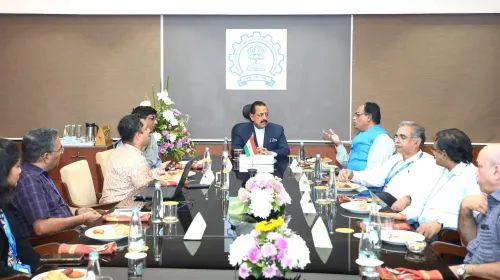Will the Labour Codes Bring Significant Advantages for Unorganised and Gig Workers?

Synopsis
Key Takeaways
- Labour Codes simplify processes for unorganised and gig workers.
- They enhance social security and working conditions.
- Support from both employers and employees has been noted.
- Promotion of Swadeshi products is encouraged.
- The Jan Vishvas Bill improves the ease of doing business.
New Delhi, Nov 25 (NationPress) The recently implemented Labour Codes are set to deliver major advantages for unorganised workers and gig workers, stated Commerce and Industry Minister Piyush Goyal on Tuesday.
He pointed out that these workers previously faced a daunting array of forms, inspections, and intricate regulations. However, the new framework streamlines these processes, ensuring access to essential facilities, social security, and improved working conditions.
The minister noted that both employers and employees have expressed support for these reforms.
While speaking at the National Conference of Trade Leaders, Goyal underscored recent reforms designed to bolster the ease of doing business while enhancing worker welfare.
He urged traders to advocate for Swadeshi products, recommending that suppliers clearly indicate the manufacturing location on product packaging and encouraging retailers to showcase their sale of Swadeshi goods.
He highlighted the critical role of expanding the reach of ‘Made in India’ products.
The minister asserted that the Jan Vishvas Bill has significantly enhanced the ease of doing business by simplifying procedures and alleviating compliance burdens.
In response to proposals regarding the concept of “One Nation, One License,” he suggested that states like Delhi and Maharashtra could pilot a single online portal that integrates both state and municipal trade licenses.
Moreover, the new labour codes are designed to promote industrial harmony, enhance productivity, and foster a balanced, growth-oriented work environment. They also aim to ensure fairness, equity, and inclusivity within India's labour market.
By establishing uniform wage standards and social security, these codes protect both workers' rights and employers' interests. In sum, the new Codes champion economic justice, facilitate formalisation, and elevate the dignity of labour.
The four Labour Codes comprise the Code on Wages, 2019, the Industrial Relations Code, 2020, the Code on Social Security, 2020, and the Occupational Safety, Health and Working Conditions Code, 2020. This landmark reform simplifies compliance, updates antiquated provisions, and establishes a streamlined, efficient framework that enhances the ease of doing business while protecting workers' rights and welfare.









